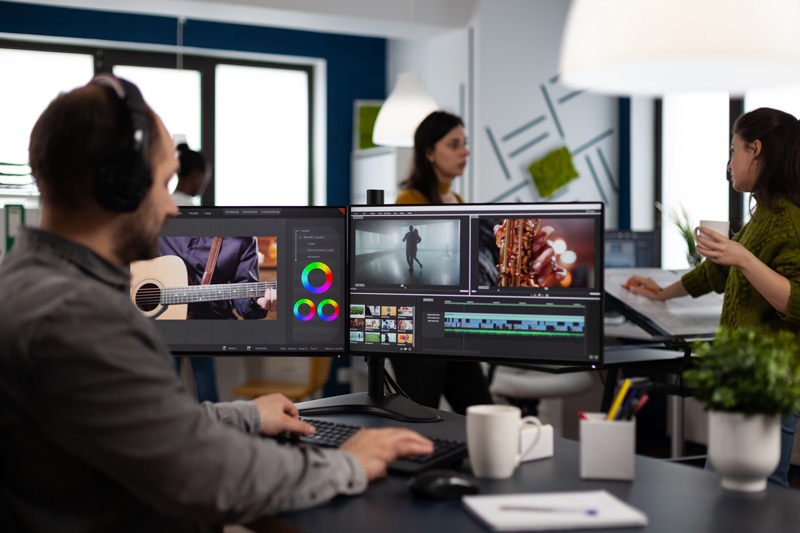A video content agency is an agency that provides services for a company or organization to produce video content. Video content agencies create various types of video content in order to reach the target audience determined by their customers or to convey a certain message.
Video content agencies can usually produce advertising and promotional videos, educational and informational videos, artistic videos or other types of videos. A Video Content agency usually consists of a professional team or network and may offer services such as video production, management and distribution.
How you feel is very important, we produce video content that makes you feel good.
Adapte Digital
We specialize in video content creation: (anytime, anywhere, any device, any culture) we are an audience-driven creative video production agency.
As digital marketing and content marketing continue to evolve, one thing is for sure: video marketing has become a must.
If you want your business and brand to be a private television or media unit, you can work with a video content agency, video marketing agency Adapte Digital.
According to Cisco, video accounts for more than 82% of all internet traffic.
Cisco

How Does a Video Content Agency Work?
The working styles of video content agencies may be different from each other, we can list the steps through the video content agency Adapte Digital as follows:
- Interviewing with the customer: First, a project brief is created by interviewing the customer to gather information about the customer’s target audience, goals and expectations.
- Project plan: A project plan is then created with the client. This plan includes stages such as the design, production and distribution of video content.
- Video design: At the stage of designing video contents, the agency chooses a topic together with the client and creates a scenario on this topic. The scenario explains what topics the video content will cover and what messages it aims to convey.
- Video production: After the video design is completed, the agency performs the video production. At this stage, the necessary resources such as the camera crew and actors are selected and video production begins.
- Video editing: After the video production phase is completed, the agency performs the video editing. At this stage, the video contents are arranged in accordance with the expectations and purposes of the customer, and sound and music are added as needed.
- Video distribution: After the video editing phase is completed, the agency distributes the video contents. At this stage, the necessary platforms and channels are used to reach the target audience of the customer.
- Monitoring and evaluation: After the distribution of the video contents is completed, the agency monitors the views and effects of the video contents and evaluates them together with the customer.
You can continue to review our video content agency page.

A video content agency usually works according to the needs of its clients. First, a meeting is held with the customer and the customer’s target audience, message and goals are determined. Next, the video content agency assembles a team or network to create video content that fits the client’s needs. This team usually consists of director, screenwriter, cinematographer, sound engineer and other professional roles.
The video agency uses all the tools and methods necessary to reach the target audience of the client. This determines where and how the video content is broadcast. For example, if the customer’s target audience is social media users, the video content is shared through social media channels. In addition, the video content agency may also use advertising or other marketing methods to reach the client’s target audience.
The video content agency may also undertake the management and distribution of the videos it produces. This determines when and where videos are posted, on which platforms they are shared, and how videos are managed. In addition, the video content agency can monitor the performance of the client’s videos and use this data to help make the videos more effective.
How Does a Video Agency Determine Their Prices?
Video agency prices are typically determined by the type, size, and difficulty level of the video content produced. For example, making a promotional video will require less work and therefore a lower price may be charged, but making a training video will require more work and therefore a higher price may be charged.
Video agency prices can also vary depending on how long the video will be, how many people view it, and on which platforms it will be posted. For example, a longer video will require more work and therefore a higher price may be charged. Likewise, a video viewed by more people may be charged a higher price.
Video agency prices may also vary based on how often video content is updated. For example, a frequently updated video content will require more work and therefore a higher price may be charged.
Video agency prices can also vary depending on the cost of equipment and techniques to be used. For example, the video agency may charge a higher price if more professional equipment and techniques are used.
Video agency prices are usually agreed with the client in advance and a special offer is made according to the client’s needs. This offer is created taking into account the type, size, difficulty level and other factors of the video content to be produced.

What Can We Do With Video?
Many different things can be done with video. For example:
Advertising and promotional videos: Videos used to promote a product or service. These videos are usually made to increase sales and attract customer attention.
Educational and informational videos: Videos used to explain a topic or demonstrate a process. These videos are generally made to facilitate learning and provide information.
Artistic videos: Music videos, short films, and other types of videos. These videos are usually made for aesthetic and emotional impact.
Event videos: Videos used for recording and sharing special events such as weddings and birthdays. These videos are usually made to preserve and share memories.
News videos: Videos that present current events and news in video format. These videos are usually made with the aim of communicating the news more effectively.
Internet videos: Videos posted on platforms such as YouTube. These videos are usually made for entertainment purposes and are made to reach viewers.
Business videos: Private meetings, training and other business videos. These videos are usually made for recording and sharing business meetings.












